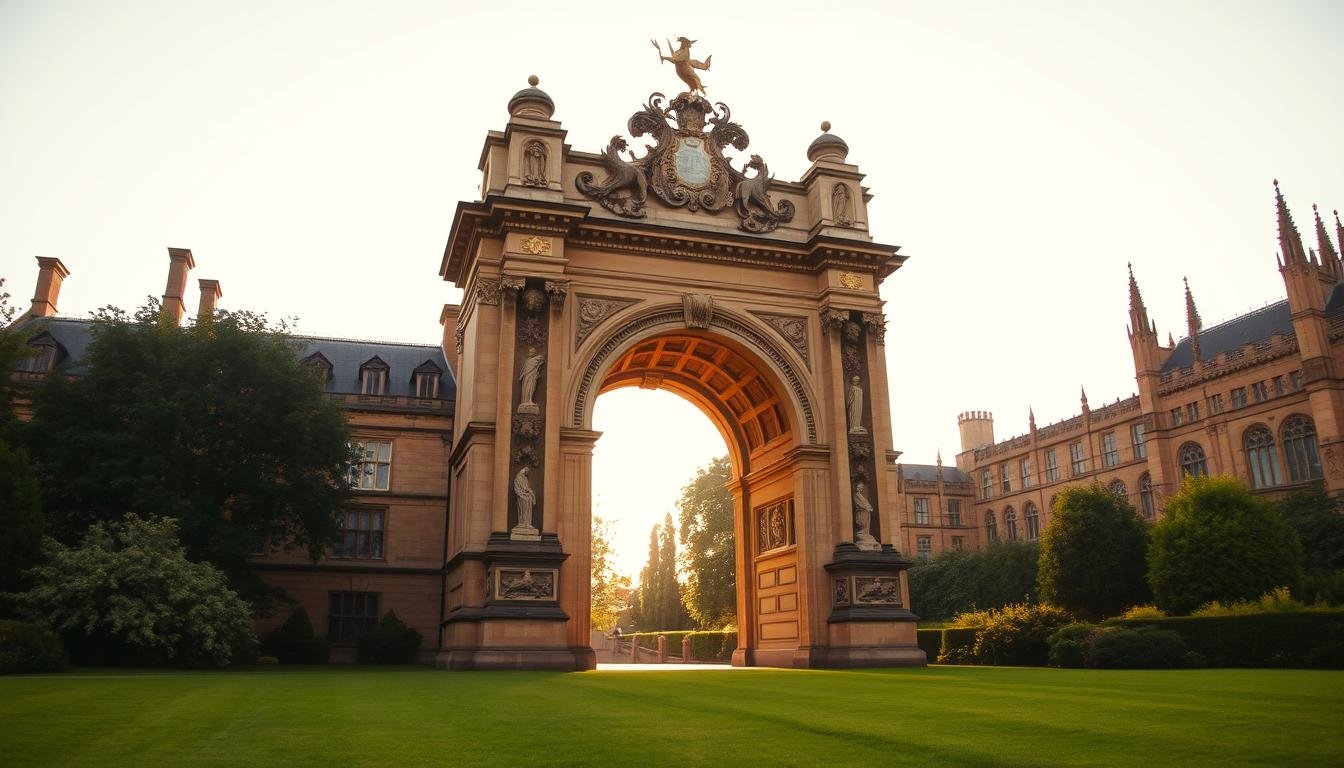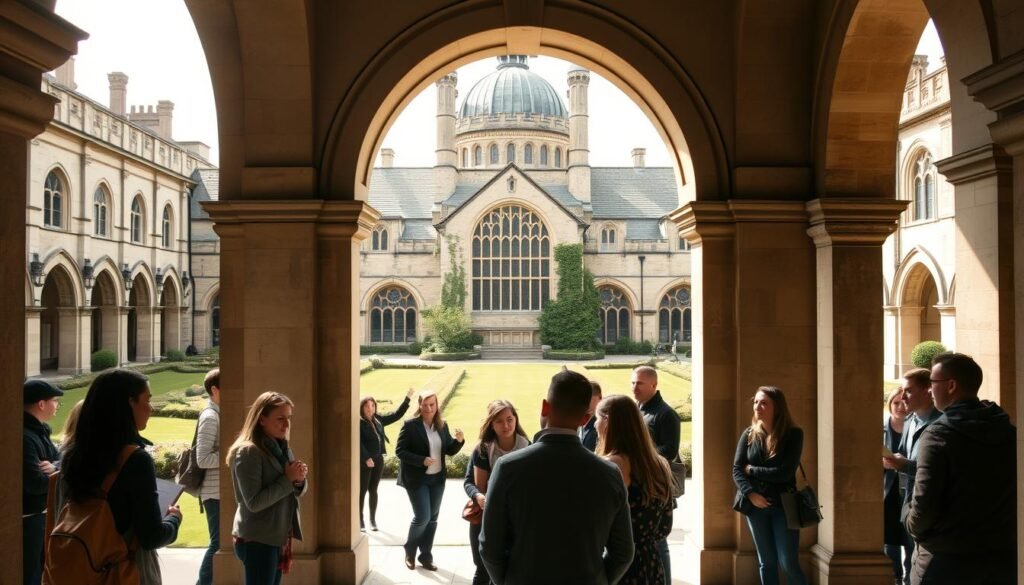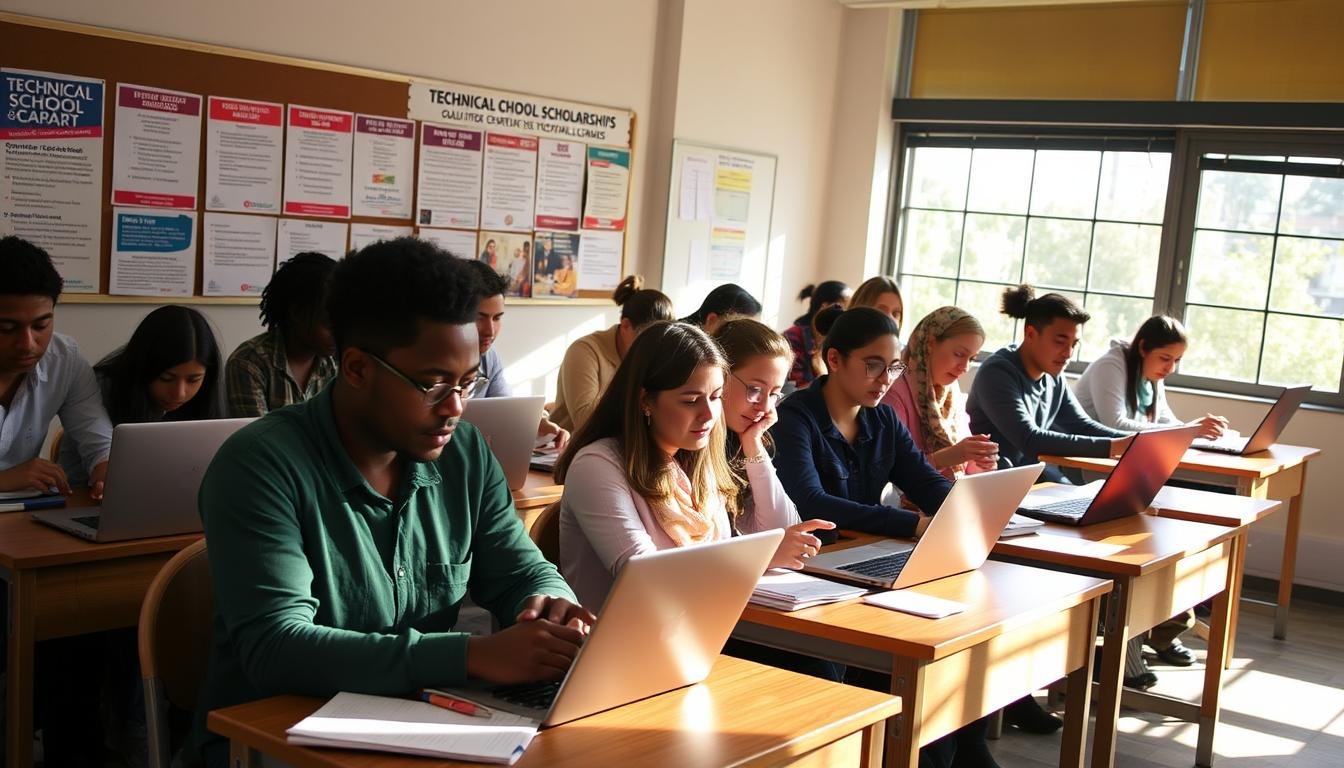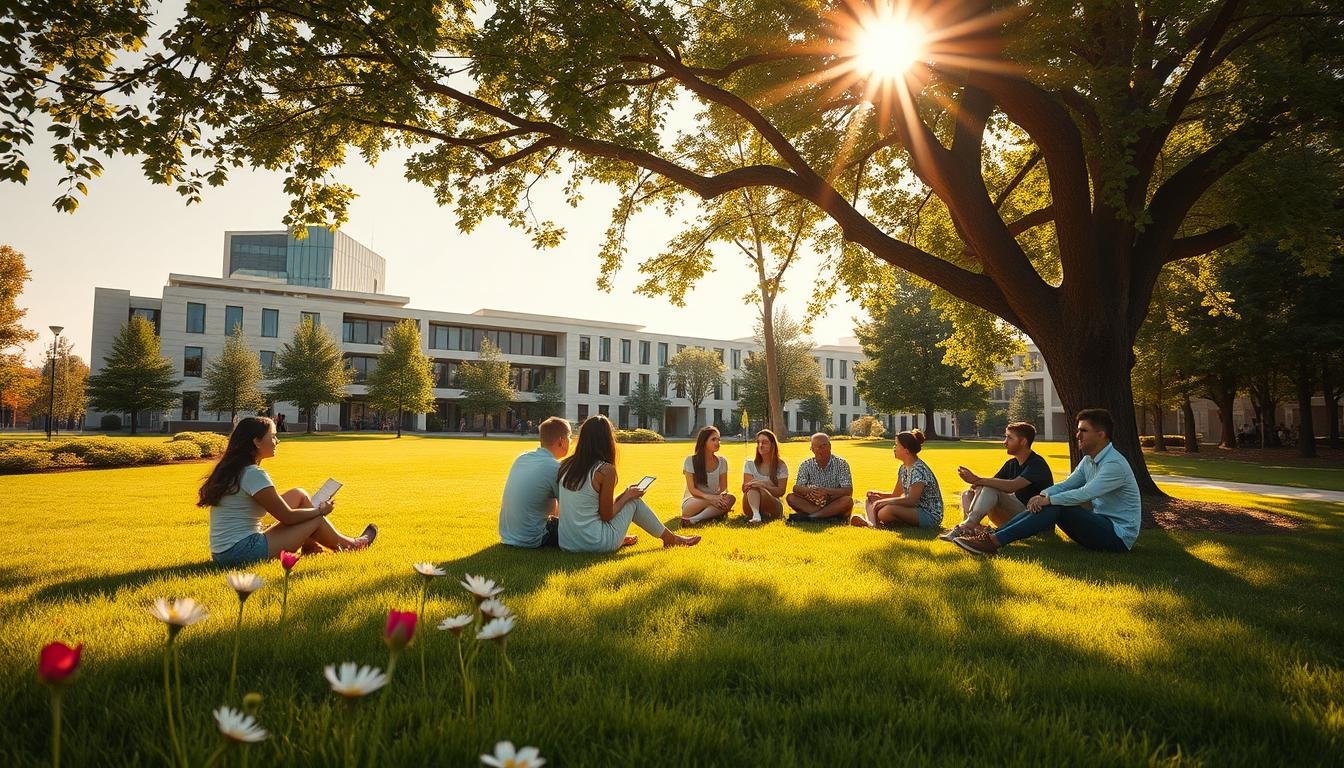What does it take to join the ranks of Nobel laureates, world leaders, and groundbreaking researchers? The Rhodes Scholarship, established in 1902, stands as one of the most prestigious academic awards globally. With a 0.7% acceptance rate, this program selects exceptional minds for postgraduate study at the University of Oxford.
Originally limited to a few countries, the program now spans 20+ constituencies, awarding 101 global scholars annually. U.S. candidates compete for 32 spots, receiving full tuition coverage and a £18,180 yearly stipend. Modern reforms have reshaped its legacy into a merit-based system accessible to diverse talents.
Key Takeaways
- Founded in 1902, it’s the oldest international postgraduate award.
- Covers 2-3 years of study at Oxford with full financial support.
- Extremely competitive, with a 0.7% global acceptance rate.
- Expanded to 20+ countries, offering 101 awards yearly.
- Includes tuition, stipend, and travel expenses.
What Is the Rhodes Scholarship?
Born from colonial-era ideals, this fellowship has evolved into a global leadership program. Its origins trace back to Cecil Rhodes, a diamond magnate whose 1902 will funded the first awards. Initially designed to promote Anglo-Saxon unity, the program now champions diversity and social justice.
History and Founding by Cecil Rhodes
Cecil Rhodes envisioned a world where education fostered imperial ties. His original 200-point selection scale prioritized academics (100 points) and athletics (30 points). The first cohort in 1903 came from the U.S., Germany, and British colonies.
Post-WWII reforms expanded eligibility beyond Commonwealth nations. By 2015, a £75M donation enabled the Rhodes Trust to award fellowships worldwide. The 2018 criteria update replaced athletic benchmarks with social justice metrics.
Purpose and Global Impact
Today, the Rhodes Trust partners with the Mandela Rhodes Foundation, fostering African leaders since 2003. Over 8,000 alumni include 120+ heads of state, like Bill Clinton and Nobel laureates.
Modern interpretations of “moral leadership” emphasize inclusivity—a stark contrast to Rhodes’ colonial ideology. The program now supports scholars from 20+ countries, united by academic excellence and a drive to solve global challenges.
Rhodes Scholarship Eligibility: Who Can Apply?
Understanding the application criteria is the first step toward securing this life-changing opportunity. The program seeks candidates who excel academically, demonstrate leadership, and meet specific regional requirements.
Academic Requirements (GPA, Degree Level)
A minimum 3.7 GPA is mandatory across all constituencies. Applicants must hold a bachelor’s degree before starting at Oxford. Some fields, like medicine, require enrollment in specific Oxford programs.
Age and Citizenship Criteria
U.S. applicants must be aged 18–24, or up to 27 if graduation was delayed. Military and PhD candidates may qualify for exceptions. DACA recipients became eligible in 2020, reflecting the program’s evolving inclusivity.
Country-Specific Eligibility (U.S. Focus)
Each country has unique rules. The U.S. awards 32 spots annually, while Canada offers 11. Puerto Rico and U.S. territories require residency proof. The Global Scholarship covers 64 non-traditional nations.
Reapplications are capped at two attempts per constituency. The first transgender scholar joined in 2019, marking progress in LGBTQ+ representation. South African candidates must attend partner schools.
How to Apply for the Rhodes Scholarship
Navigating the application process requires careful planning and attention to detail. From essays to endorsements, each component plays a critical role in securing this prestigious opportunity.
Step-by-Step Application Process
Start by registering online through the official portal. U.S. candidates must meet a campus deadline (typically July) before the national cutoff in October. Late submissions are automatically disqualified.
Prepare a detailed CV highlighting leadership roles and academic honors. The selection committee prioritizes candidates who demonstrate a balance of intellectual rigor and social impact.
Required Documents
A compelling personal statement (1,000 words max) should showcase your goals and values. Avoid generic narratives—focus on how you’ll use Oxford’s resources to address global challenges.
Secure eight recommendations, including at least four academic references. Recommenders should detail your potential for leadership and public service.
Deadlines and Nomination Procedures
The U.S. deadline falls on the first Wednesday of October each year. All applicants need a university endorsement, which may involve an internal review process.
After submission, district committees invite shortlisted candidates for interviews. Mock sessions with past scholars can help refine your responses.
Selection Criteria: What Makes a Strong Candidate?
Winning this honor demands a rare blend of intellect, drive, and ethical conviction. Committees assess applicants through four pillars: academic excellence, leadership potential, moral character, and commitment to service. Each pillar carries specific weight in the evaluation process.
Academic Excellence and Leadership
The 2022 U.S. cohort included 60% STEM majors and 40% humanities scholars, reflecting the program’s interdisciplinary focus. A minimum 3.7 GPA is non-negotiable, but top candidates often exceed this benchmark with groundbreaking research or publications.
Leadership is evaluated through tangible impact. Successful applicants showcase initiatives like founding nonprofits or leading campus movements. The “Syndicate Dinner” roleplay tests how candidates collaborate under pressure.
Character and Commitment to Service
“Moral force of character” is decoded through volunteer hours, ethical essays, and peer endorsements. Committees prioritize candidates addressing societal inequities—like tutoring underserved youth or advocating for climate justice.
Essays that critically engage with the program’s colonial legacy stand out. One 2021 winner tied their work in refugee camps to Oxford’s forced migration studies.
Interview and Endorsement Process
District committees—8–12 Oxford alumni—conduct rigorous interviews. Ethical dilemma questions reveal instincts: “How would you allocate limited vaccines?” or “Defend a controversial policy change.”
Post-interview, finalists undergo medical checks and Oxford college matching. Notable rejections like Elon Musk (1994) underscore the unpredictability of aligning with the program’s evolving values.
Benefits and Controversies of the Rhodes Scholarship
The prestige of this global rhodes program comes with both unparalleled benefits and complex historical baggage. Recipients gain transformative opportunities while navigating the award’s evolving legacy.
Financial Support and Oxford University Perks
Selected scholars receive £18,180 per year plus full tuition coverage (£16,950). The funding supports two years of study, extendable for doctoral candidates.
Additional perks include £3,000 research grants and spouse visa assistance. Health coverage comes through NHS surcharge payments. The rhodes trust also provides travel allowances for international conferences.
Historical Criticisms
Founded during colonial rule, the program initially excluded women and non-white candidates. The Rhodes Must Fall movement highlighted ongoing concerns about institutional legacy.
Until 1977, female applicants were barred entirely. South Africa’s first Black scholars only joined post-apartheid in 1991. These exclusions remain part of critical discussions.
Modern Reforms and Inclusivity Efforts
The rhodes trust implemented a 2022 Anti-Racism Action Plan across all participating countries. Recent cohorts include 30% non-binary scholars and increased Global South representation.
Comparatively, newer programs like Knight-Hennessy offer larger stipends but lack Oxford’s prestige. Alumni now work across diverse fields—22% in politics, 18% in academia—demonstrating the program’s expanded reach.
Conclusion
Securing this prestigious opportunity requires strategic planning and attention to detail. Applications for the 2024 cycle open June 1—start preparing early to meet university endorsement deadlines.
Align your projects with global priorities like climate action or the UN Sustainable Development Goals. The leadership program now emphasizes these areas, giving candidates tackling such challenges an edge.
Avoid common pitfalls like missing document notarizations. Use available resources, including alumni networks and office hours, to refine your submission.
With its expanding focus on solving world issues, this award remains a transformative path for driven scholars. Stay organized, highlight impact, and submit a polished application.
FAQ
What are the basic eligibility requirements?
Applicants must have outstanding academic achievements, typically a GPA of 3.7 or higher. They should also demonstrate leadership, character, and a commitment to service. Age and citizenship rules vary by country.
How many awards are given each year?
Around 100 recipients are selected annually from over 60 participating nations. The exact number depends on regional quotas and applicant quality.
Can international students apply?
Yes, but only through their home country’s selection process. Each nation has its own eligibility rules, so check the Rhodes Trust website for specific details.
What does the program cover financially?
The award includes full tuition at Oxford University, a living stipend, and travel expenses for two years of postgraduate study. Some courses may extend funding for a third year.
When is the application deadline?
Deadlines vary by country but typically fall in early October. U.S. candidates must apply through their university by early August for institutional endorsement.
What makes a competitive candidate?
Beyond grades, selectors look for proven leadership, intellectual curiosity, and energy directed toward solving global challenges. Athletic or artistic achievements can strengthen an application.
How does the interview process work?
Finalists participate in rigorous regional interviews assessing their intellect, values, and potential impact. Committees include former scholars and distinguished leaders.
Can I apply more than once?
Most countries allow one application per lifetime, though some permit reapplications if you weren’t previously selected as a finalist. Age restrictions still apply.
Does the program support all fields of study?
Oxford offers nearly all graduate programs, from humanities to STEM. Applicants should align their proposed course with their demonstrated talents and future goals.








